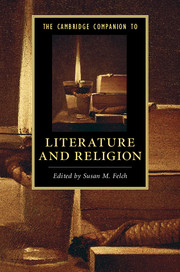Book contents
- Frontmatter
- Epigraph
- Contents
- Notes on Contributors
- Chronology of Religious Founders and Texts
- Introduction
- PART I READING PRACTICES
- PART II INTERSECTIONS
- PART III TRADITIONS
- 9 Hinduism
- 10 Buddhism
- 11 Judaism
- 12 Eastern Orthodoxy
- 13 Roman Catholicism
- 14 Islam
- 15 Protestantism
- 16 World Christianity
- Select Bibliography
- Index
- Miscellaneous Endmatter
11 - Judaism
from PART III - TRADITIONS
Published online by Cambridge University Press: 05 September 2016
- Frontmatter
- Epigraph
- Contents
- Notes on Contributors
- Chronology of Religious Founders and Texts
- Introduction
- PART I READING PRACTICES
- PART II INTERSECTIONS
- PART III TRADITIONS
- 9 Hinduism
- 10 Buddhism
- 11 Judaism
- 12 Eastern Orthodoxy
- 13 Roman Catholicism
- 14 Islam
- 15 Protestantism
- 16 World Christianity
- Select Bibliography
- Index
- Miscellaneous Endmatter
Summary
Writing this chapter as the representative of “Judaism” makes me feel something like the reluctant Moses at the beginning of the biblical book of Exodus. In chapter 3, God calls to him from a burning bush as Moses, an Egyptian-Jewish fugitive, herds his sheep in the desert. Announces God: I have come to deliver the suffering Jewish people in Egypt from slavery, and you, Moses, will be my agent and messenger to Pharaoh. But Moses declines. A long argument ensues: God keeps urging and assuring; Moses keeps objecting. According to Jewish tradition, this goes on for seven days. Finally, God's patience wears thin, and Moses, reluctantly, agrees.
Each of the biblical prophets, of whom Moses is the foremost, was reluctant. In the end, they managed to carry out their mission by speaking out of their own particular historical situation to their generation, although their words carry meaning beyond their own times. I too am hesitant; I can speak only from my position as a Jewish woman and English professor in the twenty-first century. At the same time, I'm aware of standing in a chain linking me to all the previous and forthcoming generations of Jews.
I preface my discussion of “Judaism” with this remark about generations and generativity because I want to reorient our discussion of literature and religion here away from a discourse about “texts.” A rabbinical student in a yeshiva (religious Jewish academy) in Israel once offered his rabbi an “interpretation of the text.” The teacher responded, “It's not a ‘text.’ It's your mother!” In other words, a Jew's relation to the sacred writings and traditions she or he lives and interprets is as intimate, personal, reciprocal, and complex as the deepest family relation – in fact, it is a family relation. Regardless of personal belief or practice, each Jew is part of the collective Jewish people, each Jew is inextricably tied up with all the Jews who came before and who will come after. And as in a family, you are always a “daughter” or “son” despite any disputes or attempts at disavowal.
- Type
- Chapter
- Information
- The Cambridge Companion to Literature and Religion , pp. 186 - 201Publisher: Cambridge University PressPrint publication year: 2016

